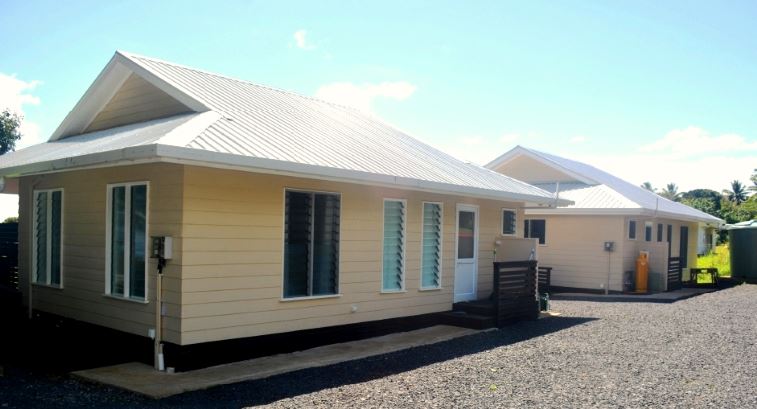Housing demand ‘far exceeds’ supply
Saturday 21 January 2023 | Written by CI News Staff | Published in Features, Go Local

One of the long-term rentals KDE Properties put out in September last year. KDE Properties had only been running short-term accommodation for about three years before the pandemic caused the Cook Islands border to shut to tourists. 23012046
Rarotonga residents and expatriates are struggling to secure housing as rents increase and landlords switch from long-term to tourist accommodation. Joanne Holden reports.
The need for long-term housing in Rarotonga “far exceeds” supply, according to a spokesperson from property management company Kimi Kāinga.
“We receive a huge number of enquiries from people looking for long-term accommodation,” says the spokesperson.
“In some situations, the need for a place to stay is urgent, (renters) having been displaced or about to be.”
According to a KDE Properties spokesman, whose company switched its seven rental homes from short-term to long-term when Covid-19 hit in 2020, one of his tenants had been asked to move out of their previous home because the owner planned to go short-term.
Meanwhile, New Zealand woman Carlene Kidwell had been looking for a place to live in Rarotonga since August last year, only securing a home less than two weeks before her partner was scheduled to start a three-year job contract as a “senior Government official” on February 1.
“My partner is retired, but consults in engineering. We love the tropical weather and a great lifestyle change in our golden years,” Kidwell told Cook Islands News from her home in Papamoa, Tauranga.
But the main obstacle to moving to the Cook Islands was “very few long-term rentals”, she says. “Apparently the locals make a lot more money out of short-term rentals.”
During her search, Kidwell had enquired with a real estate agent, on a Facebook page dedicated to long-term rentals in Rarotonga, and even with the owner of the place she and her husband stayed during a visit to the island in August. “Always the same answer: nothing available.”
Cook Islands Tourism Industry Council president Liana Scott says she knows of one landlord moving from long-term to tourist accommodation when flights from Hawaii and Australia start up later this year.
“I am aware of the difficulty in securing long-term accommodation on the island,” says Scott.
“This is not a new problem but is exacerbated by high occupancies, and at times when Government has projects on the island that require overseas expertise, long-term rentals are quickly swiped up.”
For some tourism operators, especially those with larger businesses on the island, having purpose-built accommodation for staff is a “necessary component of operations”, she adds.
Scott says securing long-term housing for workers is a challenge “in any climate or season”.
“The cost of importing labour generally factors accommodating staff as either one of the costs, or one of the hindrances.”
Kimi Kāinga mainly fielded enquires from renters looking for a studio unit or one-bedroom place, says its spokesperson, adding it seems homes with at least two bedrooms were most readily available.
“Landlords are charging significantly more for their property than locals can generally afford. This is further exacerbating the difficulties locals are experiencing when trying to secure housing.”
The spokesperson says they have “observed this trend” of landlords shifting away from long-term accommodation into short-term.
“Feedback from landlords indicate concerns about the treatment of their property or properties by long-term tenants.”
The KDE Properties spokesman says he hopes to revert to short-term in one to two years, and would be “keeping an eye” on the upcoming Hawaii and Australia flights to see if there will be enough tourists to support changing sooner.
“Right now, there’s a higher demand for long-term.
“We make less than half of what we were making in short-term rentals.
“It’s just that the short-term availability is now higher than four years ago. There aren’t enough flights to cover all the short-term rentals.
“Tourists are looking for something with a pool, aircon – it all adds up. We don’t have pools.”
Installing pools at all seven properties would be first on the agenda before making the switch, he said.
“We will put the pools in, just to give it that little bit extra to meet the demand.” While the spokesman had been renting out properties since building his first home in 2003, he had only been running them as short-term accommodation for about three years before the pandemic caused the Cook Islands border to shut to tourists.
The spokesman says some potential tenants had complained about the price of long-term rent, but it was necessary to cover the cost of maintaining the properties at a standard high enough for tourist accommodation.
“The rental prices have gone up from three years ago,” says the spokesperson. “Everything has gone up because of Covid, that’s why we’re sticking at our prices.”
Scott says long-term accommodation providers decreased the cost of rent during Covid-19 because most of the island’s workers were on minimum pay while tourism was stalled.
“Because (motel, hotel, and resort) properties were empty, some accommodated staff in rooms over this period to keep the take-home pay liveable.”
There are “pros and cons” for landlords wanting to switch from long-term housing into tourist accommodation, says Scott.
“The demand of upkeep to a high standard, regular servicing, and being on-call for guests’ enquiries – particularly when the owner is fully-employed elsewhere – can influence staying longterm.
“Short-term rentals really requires proper evaluation. Marketing, repairs, and maintenance, as well as in some instances staffing, needs to be considered. “However, if the property has the right price point and ensures a high standard of services, therefore getting good ratings via guests’ reviews, then these properties can do very well in the short-term space.”














































